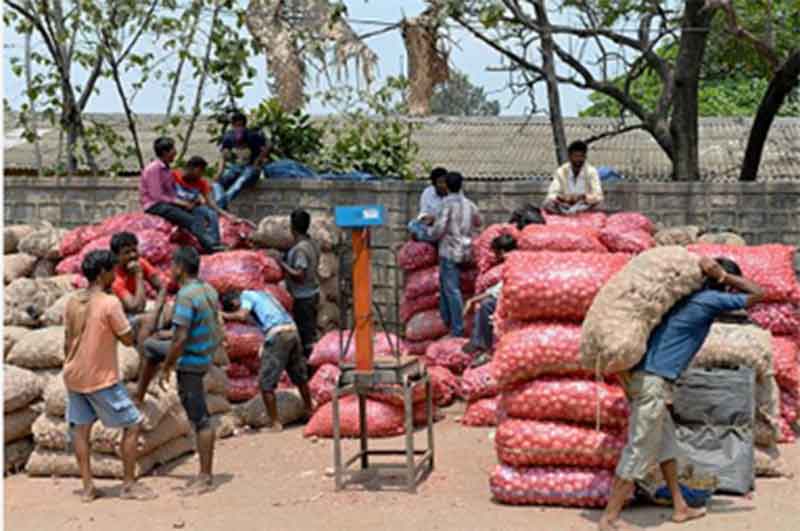
Recently the Union agricultural ministry has circulated a new draft agricultural market policy framework on agricultural marketing. Union agricultural additional secretary Mr. Faiz Ahmed Kidwai, is also committee proposed a draft marketing framework to totally revamp the existing heading a committee appointed by ministry earlier this year. According to the government proposed universal ( one tax) tax on agricultural produce across the country is aimed at getting higher incomes for farmers. The committee suggested a new frame work of agricultueral marketing mechanism replacing the present state supported market yard , laws on bulk storage and direct purchase by big private parties. Constitution of a committee comprising state agricultural ministers is proposed in the lines of empowered GST committee to collect taxes directly by Union government. The new proposals are seen as an attempt to scrap existing public market yards making entry of corporates in direct bulk buying and storage. In a way this policy is anti farmer and an attempt to repelled three farm laws three years back after historic farmers agitation.
Union government formulated the marketing frame work based on 12 market reforms recommended by a committee constituted in 2003 by then NDA government. The 12 reforms include – allowing of the setting up of private wholesale markets, permitting wholesale direct purchase by processors, eexporters, organised retailers, bulk buyers from farm-gate, declaring warehouse/silos/cold storage replacing present market yards, single-time levy of market fees across the state and a single unified trading licence valid across the state.
Key Proposals of Draft:
- Establish an empowered agricultural marketing reorm committee comprising state agricultueral ministers similar to present GST panel to move forward unified national market for agricultural produce through.
- Improve farmer-market linkage: Declare large number of need-based warehouses/col storage as sub market yards, expand & consolidate eNAM markets beyond APMC markets and marketing sub-yards.
- Agricultueral produce and Food refinement activities: Promote them and collect taxes/ fees
- Value Chains: Strengthen value chain centric infrastructure using AI technology etc with private sector participation.
- Price Insurance : Launch price insurance schemew for farmers income at the time of sowing itself.
- Ease of doing Agri-Trade: Promote Digital automation of all mandi processes, digital issuance of licences,registration to traders and major private players.
The draft trade reforms are intended to destroy stae supportd market yards and erode APMC ( Market committees) that are providing certain leel of price protection to particularly small farmers from price manipulating private trader syndicates. An attempt to reintroduce bulk produce corporate market players such as ITC,Adani and major exporters. According to the clauses listed in the new draft, these private players and corporations can directly purchase from farmers directly at farm gate. Besides , handing over produce warehouses and cold storge units hitherto under the control of APMC market yards to private players takes away provision of produce storage ( perishables lile tomatoes, fruits, onions) during price crash and other situations. Besides facilitating clauses of bulk purchase by corporate players at farm gate denies farmers right to bargain minimum support prices (MSP) announced by government. Provision of unlimited bulk purchases encourages big players to hord produce without concern of essential commodities act. Alreaady, Reliance, Adani and others have built huge warehouse facilities and even private railway lines in Sirsa, Haryana, Ludhiana Punjab. These provisions encourage super markets, eMarket grocers like Big basket or Amazon to purchase directly from farmers a harvest time by keeping the price low and evading MSPs on crop produce to farmers. Ins subsequentl months they will increase the price and sell the horded stocks to consumers at very high prices. This is what happening of volatile price fluctuations as we witness in case of tomatoes in markets . Price of markets was around Rs 60 a month back but at harvest tie it has fallen to Rs. 1 in Madapllli ( AP) markets.

Earlier introduced centralised eNAM electronic market exposes farmers to national open markets denying payment of MSPs in APMC market yards. In market yards regular auctions enable farmer to fetch better prices above MSPs. With ENAM and digital markets and bulk purchases farmers are subjected to price dictates by corporate buyers.
Provision of bulk purchases directly from farmers drastically reduces FCI (Food Corporation of India) procurement by paying MSPs and thus endangers maintenance of food grain stocks needed for Public Distribution system 9PDS). From this both farmers, workers and common people end up paying high prices on food items.
Agriculture marketing is a state subject under Entry 28 of List II of VII schedule under rticle 246 of the constitution. Diminishing role of government supported APMC market yards and collection of all taxes at mandi through eNAM and other digital electronic markets enables centrl government to collect taxes directly to central pool, similar to GST. We already know with introduction of GST, how the states lost high source of revenue and made to depend on central government for financial assistance regulalarly. As agriculture being a state subject under constitution this is a clear violation of federal system making state governments financially vulnerable.
Subscribe to Our Newsletter
Get the latest CounterCurrents updates delivered straight to your inbox.
Three years back farmers across the nation waged a historic militant struggle for 13 months at Delh bordrs and forced Union government to repel the anti- farmer laws. Both farmers and workers waging continuous struggles against their common class enemy corporate and demanding guaranteed legal purchase of of all agricultural produce and other promises made .
The proposed draft agricultural market frame work is nothing but bringing earlier repelled three farm laws and an attempt to handover markets, storage, distribution sectors completely to a few corporate players. Farmers need to be aware of these government policies and fight back to gain control over input supply, marketing, storage and supply value chain distribution from a few but major corporations.
Dr. Soma Marla is an agricultural Scientist.















































